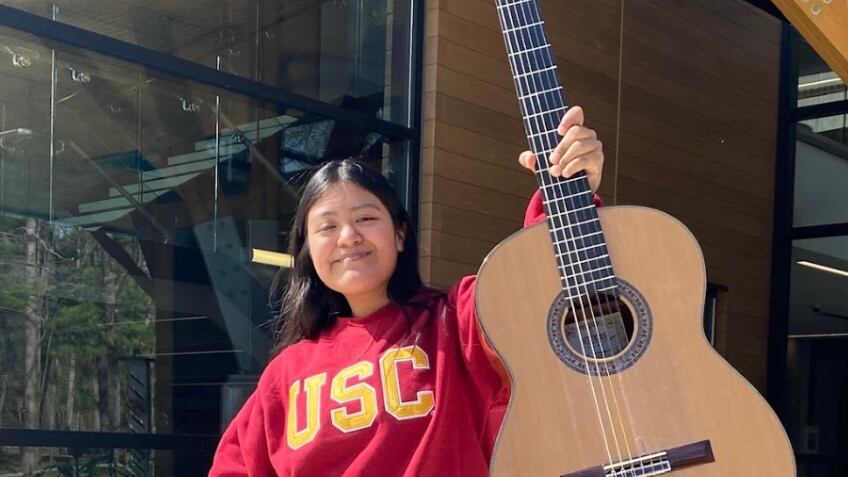Upon joining USC’s Thornton School of Music to complete her undergraduate music studies, Daniela Santiago decided to reactive an important element of the university’s musical past.
Equipped with the determination that has been the consistent thread guiding her early music career, the second-year classical guitar major helped re-establish a mariachi band on campus which resulted in the formation of Mariachi Los Troyanos de USC. The previous mariachi ensemble, Mariachi Sur de California (also known as “USC Mariachi”), was formed in 1996 remained active in different variations for over a decade but eventually went dormant.
For Santiago, 19, it made no sense that a university based in Los Angeles, a city with deep Mexican cultural roots, didn’t have an active mariachi band. Beyond this, college life without having a connection to the genre that is close to her heart and where she grew as a performing artist seemed unimaginable.
“I started off in an orchestra and obviously I love that environment,” she said. “But I also wanted to have another type of music community where I was surrounded by people like me … just the whole outfit, I love everything, the gritos (interjections), everybody cheering each other on.”
Beginning as fun, casual gatherings to play Mexican-inspired music, USC’s mariachi band is now a recognized student organization of more than 30 members that has been profiled by the local NBC station on multiple occasions.
William Kanengiser, who serves as the band’s faculty advisor and Santiago’s classical guitar professor, credits the group’s success to Santiago’s leadership and determination — qualities he noticed when she auditioned to join the school just a couple years ago.
“The moment you meet Dani, you’re struck by her drive, passion, and love of music,” he said via email. “Although she’s a small person, she can fill up a room with her smile and energy.”
When I met Santiago on a warm afternoon at USC’s Village, I quickly understood Kanengiser’s impression. As soon as Santiago began discussing her musical journey, her youthful, dark brown eyes quickly lit up and the delivery of her sentences quickened as she reminisced about encountering her first instrument, the viola, when she was only in seventh grade.
“The first time I touched the instrument, I just knew that it was the key that unlocked everything,” Santiago said, brimming with joy. “I was finally able … to unleash everything, all the potential I had.”
Santiago could be described as a musical omniglot. Beyond playing the classical guitar and the viola, she also plays the violin, ukulele and accordion. She has dabbled with the saxophone and is currently exploring a drum set in her dorm room.
“Music itself, the musical instrument is what fascinates me, just how it works, how the sound produces the tone, the technique, everything,” she said. “One of my dreams is to learn every instrument.”
Despite the classical guitar being a newer instrument for Santiago, Kanengiser believes even as a second-year student, she’s made immense progress.
“She is already playing high-level pieces with technical skills and musicality,” he said. “She’s especially adept at Mexican and South American music, but also plays Bach and classical works beautifully.”
Today, Santiago makes musical strides, but accessing training was not easy for her growing up. Born to Oaxacan immigrant parents and raised in Austin, Texas, Santiago is the first person in her family to pursue higher education. She credits her parents’ unconditional support and the support of a local non-profit dedicated to music equity, Austin Soundwaves, for her musical and academic success. Her father, a landscaper, and mother, a housecleaner, instilled the importance of working hard to pursue one’s dreams.
Because of her parents, Santiago also developed her love for mariachi music and Mexican music giants José Alfredo Jimenez and Vicente Fernandez. Her father also put her onto Mozart and Beethoven and would nag her to stay off her digital devices and instead spend that time practicing music.
“My dad has always been so supportive,” she said. “I guess he saw something in me and he would actually push me harder than I would push myself.”
Thanks to him, Santiago also began to develop her stage presence when she was about 14 years old. “When I started off in the mariachi, he would say, ‘Tienes que cantar, tienes que estar en el escenario’ (you have to sing, you have to get on that stage),” she recalled. “That would terrify me.”
Yet, as Santiago reflects now, she knows her dad’s resolve is what helped create the path to reach some of the most distinguished musical institutions in the nation and special music programs every summer since she can remember.
This past summer took her to La Guitarra Española, her first-ever international trip, for a month-long guitar intensive and festival held in Granada, Spain featuring flamenco guitar music legend and current USC Thornton School Artist-in-Residence, Pepe Romero.
Santiago reflected on witnessing who she referred to as the current “god of classical guitar” perform his most famous set. Noticing Romero had made a few minor mistakes, she came away with an observation that reflects the contagious optimism that she brings to her classical guitar practice and her life.
“It felt good knowing that we all work hard, but mistakes will still happen,” she said.
Those who know and understand her musical talents the best are assured of Santiago’s potential and the imprint she will leave at USC and beyond.
“Her dream is to create a group at USC that will represent the Hispanic culture of USC students, not only when she’s studying here, but continuing on for generations,” Kanengiser said. “I am immensely proud of all she’s accomplished so far, and the sky’s the limit for Dani.”
An earlier version of this story said that Santiago established USC’s first-ever mariachi band, but she actually helped co-found a new version of the ensemble alongside fellow student, José Romo. The university’s previous mariachi band formed in 1996. It was called Mariachi Sur de California.
